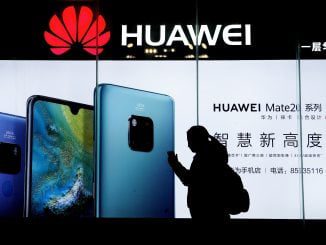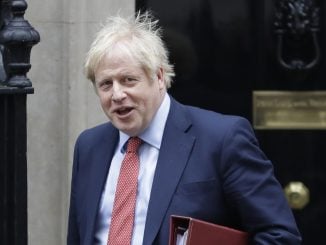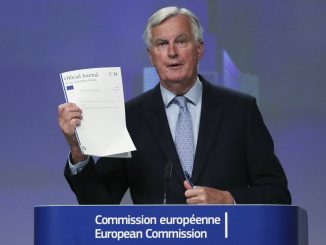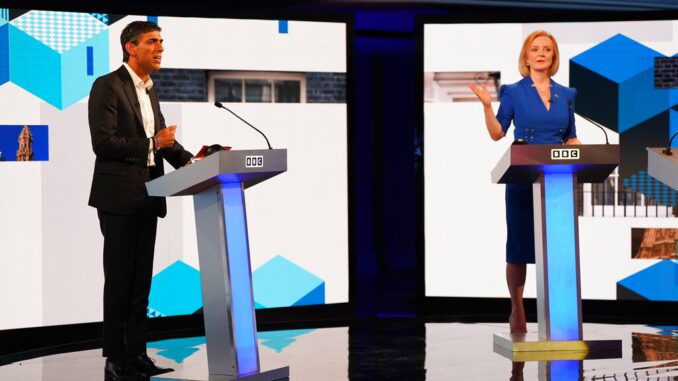
LONDON — The two candidates vying to become Britain’s next prime minister began a head-to-head battle for the votes of Conservative Party members who will choose the country’s new leader.
Former Treasury chief Rishi Sunak is promising fiscal prudence, while Foreign Secretary Liz Truss is offering immediate tax cuts to members of the right-wing governing party, which is divided and demoralized after three turbulent years under departing Prime Minister Boris Johnson.
Sunak and Truss were chosen by Conservative lawmakers — whittled down from an initial field of 11 candidates — as finalists to replace Johnson, who quit as party leader on July 7 after months of ethics scandals. He remains prime minister until his successor is chosen. The result of the party leadership contest is due on Sept. 5 and that person automatically becomes Britain’s next prime minister.
About 180,000 Conservative Party members will choose the country’s next leader. The rest of the U.K.’s 67 million people will watch the campaign from the sidelines, as the candidates spar in televised debates and party meetings — against a backdrop of soaring prices, growing climate extremes that broke U.K. temperature records this week and the war in Ukraine. The winner set to be announced Sept. 5.
The winner of the Conservative contest will not have to face British voters until 2024, unless he or she chooses to call an early general election.
Oddsmakers say the favorite is Truss, who has led the U.K.’s response to Russia’s invasion of Ukraine and is running as a low-tax, small-state conservative in the mold of Margaret Thatcher.
In interviews, Truss said she had the “toughness” and “grit” to lead the country in troubled times.
“We are in very difficult times. We need to be bold,” she recently told the BBC. “We cannot have business as usual for the challenge we face.”
Sunak, who steered Britain’s economy through the pandemic before quitting Johnson’s government this month, also claims to wear the mantle of Thatcher, whose free-market policies transformed Britain’s economy in the 1980s. Sunak argues it would be irresponsible to slash taxes before getting inflation under control. He won the vote among party lawmakers, but his previous role as Britain’s chief taxman may go down less well with the Tory grassroots.
Writing in the Daily Telegraph, Sunak said “low inflation and sound public finances” were needed as the foundation of the economy.
In a dig at Truss, lawmaker Robert Jenrick, a Sunak supporter, said “it is the antithesis of Thatcherism to be going around making unfunded tax pledges merely to win a leadership contest.”
Sunak also faces open hostility from allies of Johnson, who consider him a turncoat for quitting the government earlier this month, a move that helped bring down the prime minister.
Johnson clung to office through months of scandals over his finances and his judgment, refusing to resign when he was fined by police over government parties that broke COVID-19 lockdown rules. He finally quit after one scandal too many — appointing a politician accused of sexual misconduct — drove his ministers to resign en masse.
Both Truss and Sunak are aiming to distance themselves from the ethical swamp around Johnson, while persuading Tories they can match his election record, which delivered a landslide victory to the Conservatives in 2019.
Rhys Smithson, a Conservative local councilor from Colchester in eastern England, said he still remained undecided after listening to the two candidates.
“Sunak is probably more grown up, but I would say Truss is more passionate,” he said. “Truss will appeal more to members, I think Sunak will appeal more to the electorate.”
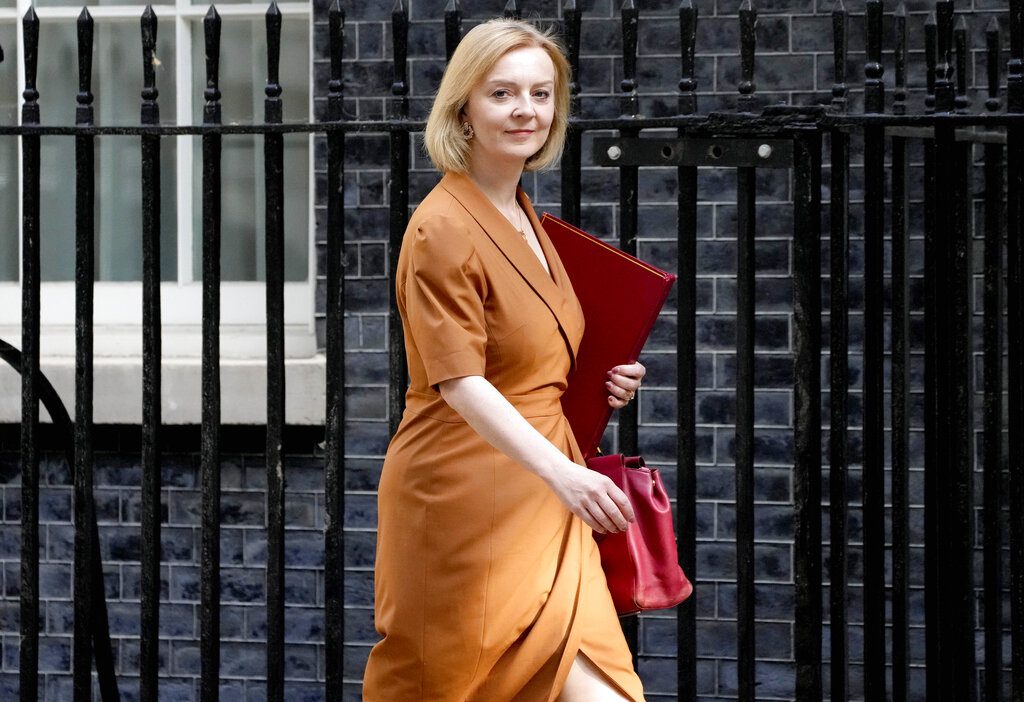
LIZ TRUSS
Fans of Liz Truss think she is the new Iron Lady.
If Truss wins, she would become Britain’s third female prime minister. She has forged her image in homage to the first, Margaret Thatcher.
Truss has posed in a British Army tank in Eastern Europe, evoking an image of Thatcher during the Cold War. In a televised leadership debate this week, Britain’s top diplomat sported a pussy-bow blouse eerily similar to one the late prime minister used to wear.
Truss, 46, is a favorite among many Conservatives, who revere Thatcher above all other leaders. Critics say it’s an empty homage and believe Truss lacks the gravitas to lead the country amid economic turbulence and a European war.
As foreign secretary, Truss has been front and center in Britain’s support for Ukraine and Western sanctions against Russia over the invasion of its neighbor. She also has figured prominently in the U.K.’s feud with the European Union over post-Brexit trade arrangements.
Her pugnacious approach — along with her promises to slash taxes and boost defense spending — have made her the favorite of the party’s strongly euroskeptic right wing.
Writing in the Daily Telegraph, Truss said she was “the only person who can deliver the change we need on the economy — in line with true Conservative principles — and the only person capable of stepping up and leading the response to Ukraine and the increased security threat that the free world faces.”
But opponents criticize her as a dogmatist and a wooden public speaker, and note that she has not always been a true-blue Tory.
Born in Oxford in 1975, Truss is the daughter of a math professor and a nurse who took her on anti-nuclear and anti-Thatcher protests as a child, where she recalled shouting: “Maggie, Maggie, Maggie — out, out out!”
Truss attended a public high school in Leeds, northern England, and then studied philosophy, politics and economics at Oxford University, where she briefly belonged to the centrist Liberal Democrats and called for the abolition of the monarchy.
She worked as an economist for energy giant Shell and telecommunications firm Cable and Wireless, and for a right-of-center think tank while becoming involved in Conservative politics and espousing free-market Thatcherite views. She ran unsuccessfully for Parliament twice before being elected to represent the eastern England seat of Southwest Norfolk in 2010.
Truss is married to Hugh O’Leary, with whom she has two teenage daughters.
In Britain’s 2016 referendum on whether to leave the European Union, Truss backed the losing “remain” side. But she has served in Johnson’s staunchly pro-Brexit government as trade secretary and then foreign secretary, and has won the support of the Conservative Party’s most fervent Brexiteers.
Her record as foreign secretary has drawn mixed reviews. Many praise her firm response to the invasion of Ukraine, and she secured the release of two British nationals jailed in Iran where her predecessors had failed. But EU leaders and officials hoping she would bring a softer tone to the U.K.’s relations with the bloc have been disappointed.
Tim Bale, professor of politics at Queen Mary University of London, says the fact that euroskeptics adore Truss, while suspecting Sunak of pro-EU views — despite that fact that he backed “leave” in the referendum — shows the importance of image over substance in politics.
“His image doesn’t fit that of a Brexiteer whereas hers does,” Bale said. “There’s a kind of presumption that if you’re a bit of a smoothiechops who moves easily in international circles you must be a remainer, and if you’re someone who tells it like it is to Johnny Foreigner then you’re obviously a (true) Brexiteer.”
RISHI SUNAK
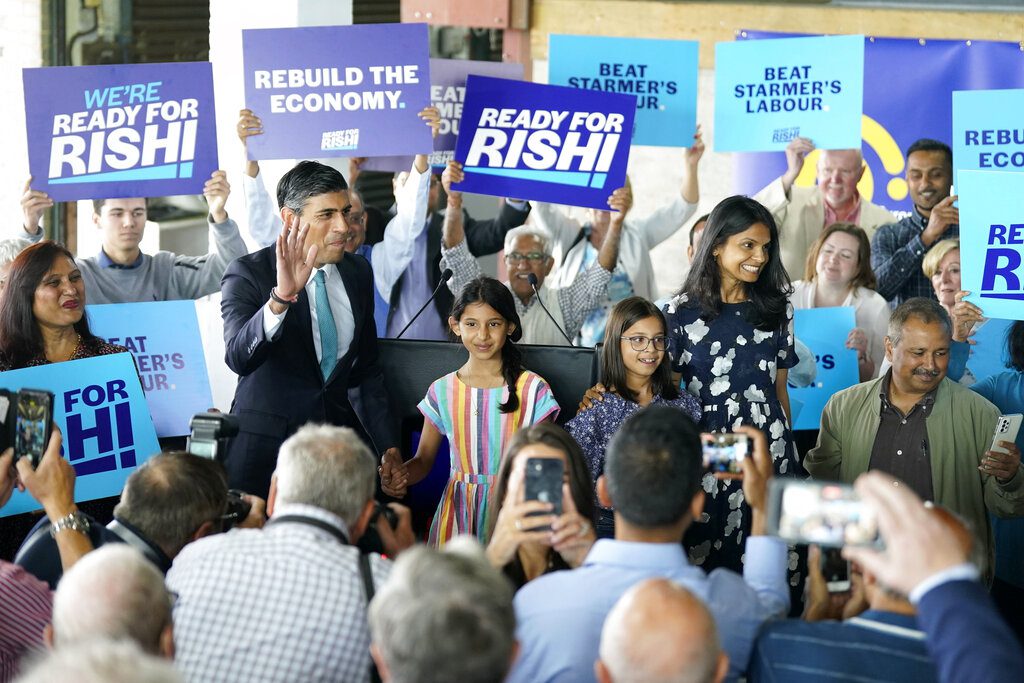
Rishi Sunak was seen as Boris Johnson’s natural heir, until he turned on the prime minister who put him in charge of Britain’s economy.
The former Treasury chief, who quit earlier this month after questioning Johnson’s competence and ethics, is one of the two final contenders to replace Johnson as Conservative Party leader and prime minister — but he faces fierce opposition from Johnson and his allies, who consider him a turncoat.
At 42, Sunak would be the youngest prime minister in more than 200 years and the country’s first South Asian leader.
Sunak was born in Southampton, on England’s south coast, in 1980 to Indian parents who were both born in East Africa. He grew up in a middle-class family, his father a family doctor and his mother a pharmacist. He has described how his parents saved to pay for a private education, and he attended Winchester College, one of Britain’s toniest and most expensive boarding schools.
There, he mingled with the elite. Rivals recently dug up a clip from a 2001 TV documentary about the class system in which the 21-year-old Sunak said he had “friends who are aristocrats, I have friends who are upper class, I have friends who are, you know, working class — well, not working class.”
After high school Sunak studied philosophy, politics and economics at Oxford University — the degree of choice for future prime ministers — then got an MBA at Stanford University.
He worked for the investment bank Goldman Sachs and as a hedge fund manager and lived in the U.S., where he met his wife, Akshata Murty. They have two daughters.
Returning to Britain, Sunak was elected to Parliament for the safe Tory seat of Richmond, in Yorkshire, in 2015 and served in several junior ministerial posts before being appointed Chancellor of the Exchequer by Johnson early in 2020, just before the pandemic hit.
His furlough program, which paid the salaries of millions of workers when they were temporarily laid off, made him the most popular member of the government — a status “Dishy Rishi” burnished with slick social media messages that stressed his own brand more than the government’s.
Sunak’s sure-footedness has wobbled over the years. Critics said a campaign to get people to eat in restaurants after lockdown restrictions were eased in the summer of 2020 contributed to another wave of COVID-19.
He also has faced questions about his wealth and finances. His wife is the daughter of the billionaire founder of Indian tech giant Infosys, and the couple is worth $877 million, according to the Sunday Times Rich list. In April it emerged that Murty did not pay U.K. tax on her overseas income.
The status was legal but it looked bad at a time when Sunak was raising the taxes of millions of Britons. Sunak also was criticized for holding onto his American Green Card — which signifies an intent to settle in the U.S. — for two years after he became Britain’s finance minister.
Sunak also was fined by police, along with Johnson and more than 80 others, for attending a party in the prime minister’s office in 2020 that broke coronavirus lockdown rules.
Sunak’s leadership campaign has been the most professional of any contender, from a slick launch video to a coterie of aides to marshal support.
He has depicted himself as the candidate of grown-up decisions and fiscal probity, calling rivals’ tax-cutting plans reckless and vowing to get inflation under control. He frequently mentions his political idol, Thatcher, but has nonetheless been cast by rivals as a left-wing, tax-and-spend politician, and has been subjected to mudslinging by Johnson’s allies.
Steven Fielding, professor of political history at the University of Nottingham, says Sunak “has got the demeanor of a daytime chat show host.”
“He’s plausible, he’s glib,” Fielding said. “He’s very like (former Prime Minister) David Cameron in that regard. He’s plausible, and yet somehow you think you’re being lied to.”

